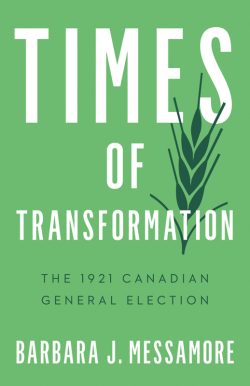Election parallels a century apart
Times of Transformation: The 1921 Canadian General Election
by Barbara J. Messamore
Vancouver: UBC Press, 2025
$19.56 / 9780774870597
Reviewed by Ron Verzuh
*

In the spring of 2025, we held our collective breath as an increasingly tyrannical Donald Trump threatened our sovereignty, our economy, and our pride as a nation. About 100 years earlier, our ancestors went to the polls to change much of the political landscape for generations. Times of Transformation takes us back to a period of volatility and uncertainty to match today.
Leading up to the 1921 election, reciprocity with the United States was a salient issue in the House of Commons. Free trade vs tariffs, the shaping of new federal parties in the wake of the First World War, and the electoral landscape were all shifting.
As Barbara Messamore shows, among disenfranchised groups some women did finally win the vote in 1921. After the 1920 Elections Act women got the right to vote on terms that were equal to men. However, “the new rules continued to disqualify ‘an Indian ordinarily resident on an Indian reservation,’ a provision not changed until 1960.”
Nor did Asian Canadians have the franchise. In fact, British Columbia’s federal politicians were adamant that they would never have it, leaving a black mark well past 1921 as Canada continued to discriminate against Chinese immigrants. As Sir John A. Macdonald put it, “the Chinese has no British instincts or British feelings or aspirations and therefore ought not to have a vote.”
In spite of women having voting rights, humourist Stephen Leacock predicted that “women do not think enough of one another to elect women.” He was mistaken. In 1921, former school teacher Agnes MacPhail was elected the country’s first woman parliamentarian and social reformer Nellie McClung was elected to the Alberta legislature. McClung was one of the “Famous Five” who fought for recognition as “persons” in Canadian law. She and MacPhail did much for the cause of electoral reform and women’s rights.
MacPhail represented another major shift in the political landscape because she was a candidate for a new federal force called the Progressive Party. As Messamore notes, the rise of the Party “was part of a wider drive to remake political life, a quest to purify and transform the sordid clientelist partisan atmosphere of the past.”

With population growth in Western Canada expanding, farmers could form an effective movement. The key issue driving the party was tariffs; they were against them. These were tariffs on goods entering Canada set by the federal government.
They were not quite the same as Trump’s ill-consider ones falsely meant to penalize Canada for not stopping the virtually non-existent cross-border flow of the illegal drug fentanyl. In the era preceding the 1921 election, Parliament set trade tariffs to protect eastern Canadian industry. That hit farmers hard as they were forced to pay inflated prices for manufactured goods. The anti-tariff fervour saw the wave of agrarian politicians create a viable third party that resulted in “the first-ever post-Confederation minority government.”
It fizzled after a few years, but foreshadowed the formation of the Cooperative Commonwealth Federation led by J.S. Woodsworth in 1932. He had been elected for the first time in 1921 partly due to his role in the 1919 Winnipeg General Strike and his editorship of the Western Labour News. Twenty years earlier another Winnipeg labour newspaper editor Arthur Puttee was elected the first labour MP in Canada. Memories of the strike reverberated throughout Canada making the labour movement another key factor in the 1921 election.
Another factor made the election significant. It was the victory of the newcomer William Lyon Mackenzie King, the young leader of the Liberal Party, over Conservative prime minister Arthur Meighen. King would be prime minister, almost uninterrupted, for years to come. Both men are briefly profiled along with others in a “List of Key Players.”

In the federal election campaigns of 100 years ago, U.S. politicians threatened Canada’s sovereignty. As Messamore notes, in 1911, one politician hoped “the American flag will float over every square foot of the British North American possessions clear to the North Pole.”
Today, the country faces similar threats of annexation. In addition, Danielle Smith, the right-wing premier of Alberta, is leading a charge the could presage a constitutional crisis. Could we be seeing a revival of the old agrarian activism of the 1920s only with oil instead of wheat driving it forward?
Messamore doesn’t predict such potential outcomes. Her job, and she does it well, is to reveal the historical facts about early 20th century elections. But are we also seeing parallels to our political past in the run-up to our April 28 federal election?
Times of Transformation is not just a study of an election. It is a book that would serve well as a high school history text. All the basic issues are covered in detail, from Prairie regionalism to Quebec nationalism, from the One Big Union and the Winnipeg General Strike to feminism, the conscription crisis, and historic injustices against immigrants and First Nations citizens.
As the author puts it in her preface, 1921 was a year when “some long-building changes burst forth in what seemed to be an abrupt upheaval in Canadian politics.” Perhaps we are on the eve of another such upheaval, one that could upend the Canadian way of life we have enjoyed since the Second World War.
*

Ron Verzuh is a writer, historian, and great grandpa. [Editor’s note: Ron has recently reviewed books by ošil (Betty Wilson), Nathan Hellner-Mestelman, Dietrich Kalteis, Graeme Menzies, Ron Base and Prudence Emery, and Geoff Mynett for The British Columbia Review.]
*
The British Columbia Review
Interim Editors, 2023-26: Trevor Marc Hughes (non-fiction), Brett Josef Grubisic (fiction)
Publisher: Richard Mackie
Formerly The Ormsby Review, The British Columbia Review is an on-line book review and journal service for BC writers and readers. The Advisory Board now consists of Jean Barman, Wade Davis, Robin Fisher, Barry Gough, Hugh Johnston, Kathy Mezei, Patricia Roy, and Graeme Wynn. Provincial Government Patron (since September 2018): Creative BC. Honorary Patron: Yosef Wosk. Scholarly Patron: SFU Graduate Liberal Studies. The British Columbia Review was founded in 2016 by Richard Mackie and Alan Twigg.
“Only connect.” – E.M. Forster